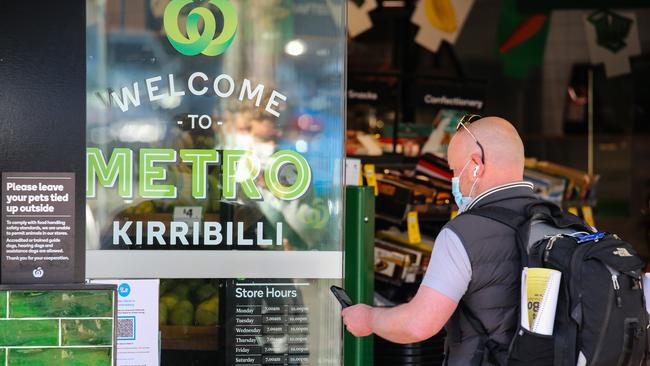Food inflation more than doubles over the three months to December: UBS report
Supermarket sales are expected to benefit from food inflation more than doubling over the three months to December as shoppers feel the pinch.

Business
Don't miss out on the headlines from Business. Followed categories will be added to My News.
Supermarket food prices have increased more than 1 per cent in the three months to the end of December – more than double the increase recorded in the previous quarter – hitting household budgets but proving a positive for sales growth at Woolworths and Coles.
Meanwhile shoppers are seeing more variety on the shelves, despite the interruptions of Covid-19 on supply chains, with Coles slowly closing the gap with Woolworths and breadth of range remaining a key point of difference between the nation’s major supermarket chain operators.
A report on the supermarket industry from UBS analyst Shaun Cousins has found that food inflation trends rose in the second quarter of the 2022 financial year, with industry inflation at 1.1 per cent, up from 0.4 per cent in the first quarter. Dry grocery inflation was 1.1 per cent and fresh food inflation was up 1.2 per cent, Mr Cousins wrote in the note.
Inflation was higher for Woolworths (1.3 per cent) against Coles (0.9 per cent) in the three months to December 31, consistent with the previous three-month period, in which Coles recorded price rises of 0.3 per cent and Woolworths 0.5 per cent.
On Tuesday, the Australian Bureau of Statistics revealed that the consumer price index ran up 1.3 per cent over the last three months of 2021 – and ended the year 3.5 per cent higher. The spectre of higher inflation has also led the Reserve Bank to consider an earlier rise in the official cash rate.
The impact on supermarkets of higher prices can be mixed, but also a positive as it can support like-for-like sales growth.
“Like-for-like sales growth for Coles and Woolworths has been supported by food inflation over the long term (pre-Covid) and hence it can again support like-for-like sales growth,” Mr Cousins wrote. “Food inflation is a positive for food retailers, having risen in the second quarter of 2022 with further increases expected which should support revenue growth, yet its impact is not all positive.
“An even more positive outcome for retailers is where suppliers endure some of the cost of goods sold pressure themselves, or Woolworths is able to creep prices higher. We do not envisage these more bullish outcomes given the breadth and depth of food inflation expected to come in calendar 2022, yet recognise this has been a support in prior years.”
However, Mr Cousins said higher food prices could see some potential trade down to private label and smaller pack sizes, while the gradual reopening of the economy – especially restaurants and cafes – could see consumers switch out of cooking at home.
In terms of in-store offers, Mr Cousins said both retailers increased range during the second quarter and that Coles was catching up with Woolworths in this key metric. “Coles is slowly closing the gap with Woolworths on range, yet Woolworths continues to enjoy sustained leadership in range with only a single month where the range gap was equalised,” he said. “We continue to see breadth of range a key point of difference for Woolworths vs Coles and other competitors.”
The key challenge for supermarkets in the coming year will also be their reaction to the continued opening of the economy and as consumers become more confident in eating out more and shop less at their local supermarket.
Consumers will also exit the Covid-19 pandemic cashed up after years stuck at home or in isolation. Where this cash ultimately lands will fuel or cap supermarket sales growth.
UBS has retained a preference for consumer discretionary versus food retail consumer staples, with both Coles and Woolworths rated a sell by the analyst and wholesaler Metcash a buy.
“Food retail enjoys the tailwind of food inflation, with further evidence from the UBS Evidence Lab grocery price tracker for the second quarter of 2022 and industry feedback indicative of further increases in calendar 2022,” it says. “Yet headwinds remain across volumes and channel shift with cost savings to offset these headwinds difficult to access, especially given the pace of the structural shift to online.”
Originally published as Food inflation more than doubles over the three months to December: UBS report



